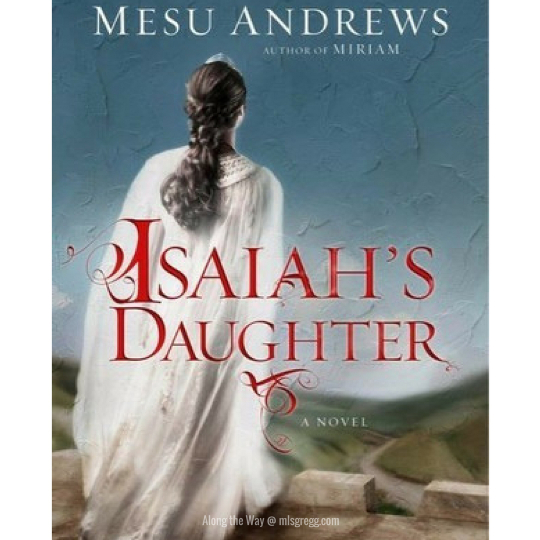
Gentle Reader,
Manasseh was twelve years old when he became king, and he reigned fifty-five years in Jerusalem. His mother’s name was Hephzibah. …
You shall no longer be termed Forsaken,
Nor shall your land any more be termed Desolate;
But you shall be called Hephzibah, and your land Beulah;
For the Lord delights in you…– 2 Kings 21:1, Isaiah 62:4 (NKJV)
I discovered Mesu Andrews over the summer, when my mom loaned me a book that she thought I might like. That book was Pharaoh’s Daughter. I was immediately hooked. In just a few short months I have devoured all but one of the books that Andrews has written and that only because I can’t get my hands on it. Andrews spends years researching her novels, placing faithfulness to the test of Scripture over and above her desire to tell a good story. And she is, without doubt, an excellent storyteller. Her ability to delve into the richness of the Bible and explore how people lived, how God moved in their lives is one that I have encountered in only a few other authors.
Isaiah’s Daughter, releasing in January 2018, is both a stand-alone novel and a continuation of the story begun in Love in a Broken Vessel (a fictionalized version of the book of Hosea). Those who have read the former will recognize characters and themes in the latter, but understanding and enjoying the book does not hinge on knowing what came before.
Andrews opens in 732 B.C.. Soldiers from the northern kingdom of Israel have attacked Judah, destroying towns and carrying off hundreds of captives. The reader meets 5-year-old Ishma and her friend Yaira, who are among the captives. The trauma they have experienced has rendered Ishma unable to speak. Yaira attempts to care for her on the long journey, but she, a child herself, cannot ease the fear in Ishma’s heart. This fear is a central theme of the novel.
Yaira’s brother, the prophet Micah, finds the two girls. He is unable to raise them himself due to the nature of his calling, so he takes them to Jerusalem and settles them in the house of Isaiah – fellow prophet and royal counselor who has just been demoted to tutor after angering Judah’s king, Ahaz. The girls expect to be taken into service, but Isaiah and his wife, Aya, embrace them as daughters. A new world is opened to them.
Queen Abijah is part of this new world. One day, she brings her son, Hezekiah, to the prophet’s house. He, too, has suffered trauma. Abijah is desperate for his healing. Nothing she has tried, no prayer or remedy, has made any difference. Ishma is drawn to the little boy with the sad eyes.
Since all of this happened thousands of years ago, it’s not spoiler alert territory to say that Hezekiah grows up to marry Ishma, who is renamed Hepzibah. Normally I loathe a predictable romantic tale, but Andrews masterfully weaves together threads from the 2 Kings narrative, the prophecies of Isaiah and historical record to breathe a freshness into the standard “boy meets girl” formula. Hezekiah and Ishma grow up in dangerous times. Theirs is no easy, simple pairing, before or after their marriage. Andrews writes them as the flawed people they are, a man and a woman who wrestle with what it means to obey God.
My one complaint is in regard to Ishma/Hepzibah’s characterization. It’s a little uneven. As she grows, she discovers a love of learning and nature, both of which help to heal her heart. Then, upon reaching adulthood and marriage, the fear comes crashing back in. As one who battles anxiety on a daily basis, I understand completely how this kind of thing happens. Yet, as a reader, I wanted to see Ishma/Hepzibah become tougher. I wanted her to experience the fear but grit her teeth and battle through. Instead, in a few scenes, she becomes the damsel in distress, weeping in the arms of her husband. Crying is never bad and of course spouses should support each other, but there was just something “off” about that to me.
Part of the unevennness may be rooted in the viewpoint changes that occur each chapter. The story shifts between Ishma/Hepzibah, Hezekiah and sometimes Isaiah. Though we are reading the story of a woman, it’s not completely told through her eyes. I’m not sure why Andrews made this decision. It does work, for the most part, only becoming an issue in later chapters, when, as I pointed out above, I wanted Ishma/Hepzibah to grow more than she did.
Minor issues aside, I wholeheartedly recommend this book (and all of Andrews’ other novels). You will be intrigued and entertained from the first pages. You will be prompted to think and to search the Scriptures. Most of all, you will be moved to worship the Lord, who teaches us to live in this light:
“We must keep our eyes on eternity, my friend, for today is sometimes more than we can bear.”
– p. 318






